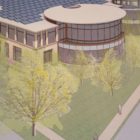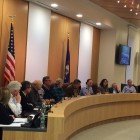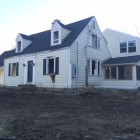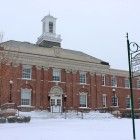Government
‘A Very Good Investment for Our Community’: Town Could Help Library Acquire Key Final Property for Rebuilding Plan
|
The town stands to benefit aesthetically, culturally and otherwise if New Canaan Library in planning its rebuilt facility has a properly sized and configured parcel with which to work, officials said Tuesday. Because of setback regulations, a major gateway into the New Canaan at South Avenue and Maple Street realistically could only serve as a parking lot unless the library is able to acquire a key .19-acre property on its block, the town’s highest elected official said during a meeting of the Board of Finance. So if it’s feasible and residents and town officials support the idea, New Canaan ought to consider helping the library purchase that property, according to First Selectman Rob Mallozzi, who serves as chairman of the finance board. “There is an opportunity for this town to demonstrate to our library what we think and be a partner in their vision that I think is fundamental for the success of this community,” Mallozzi said during the finance board’s regular meeting, held at Town Hall. Doing so would bolster “the look and feel of the community as you approach our downtown village, and, I think, truly jumpstart a capital campaign to the library that would lead to a phenomenal facility over the next few years.”
He added: “I think it would be a very good investment for our community.”
That investment, if it’s made, remains some months away, according to finance board member Neil Budnick.




